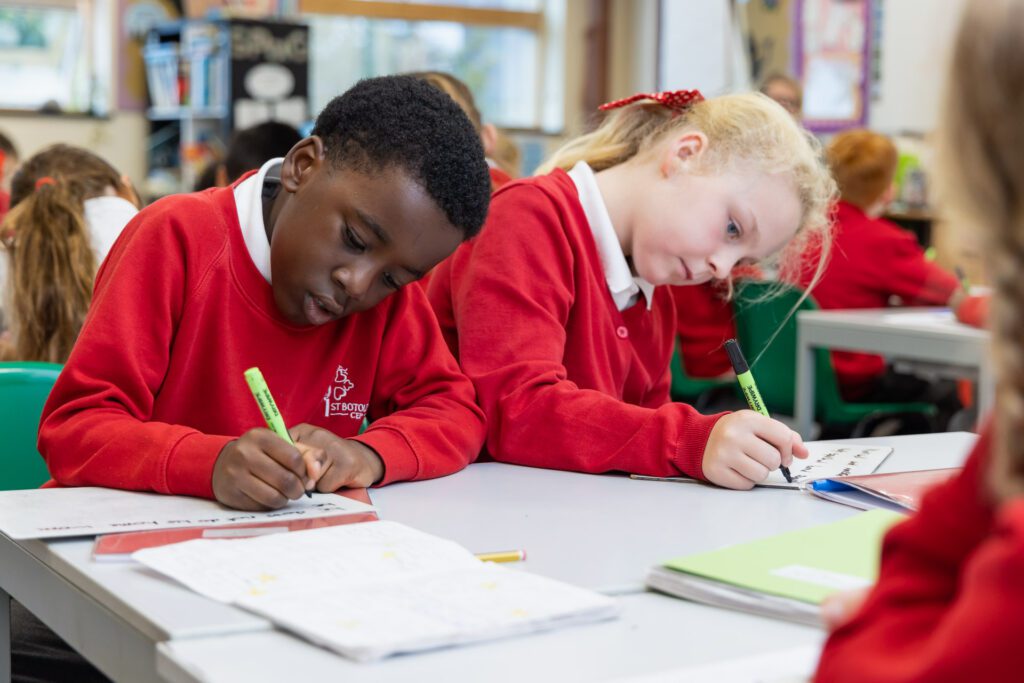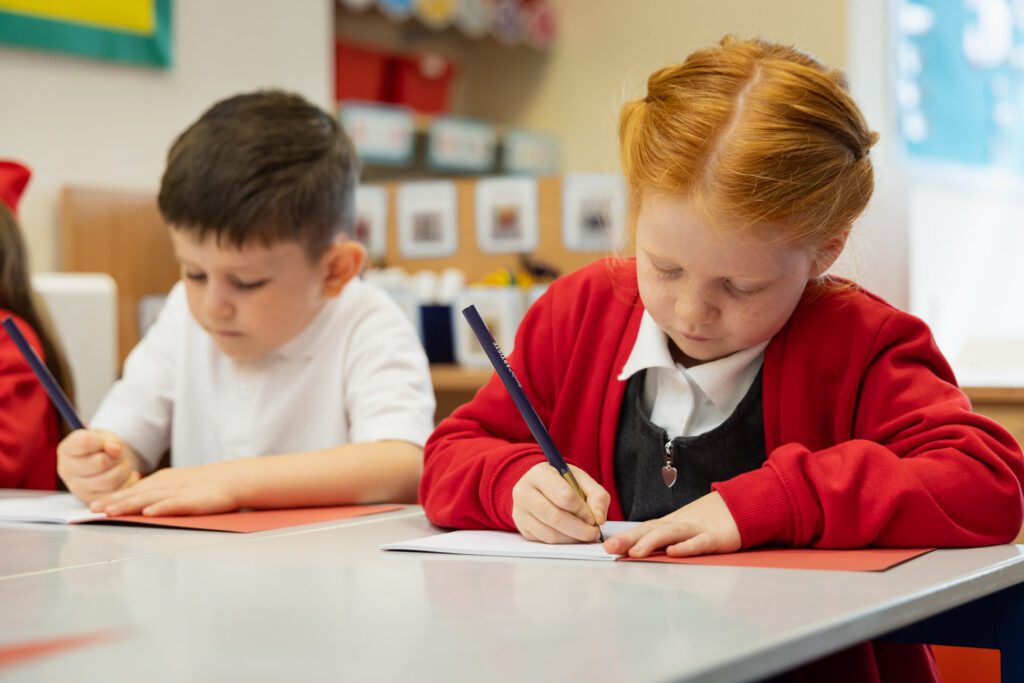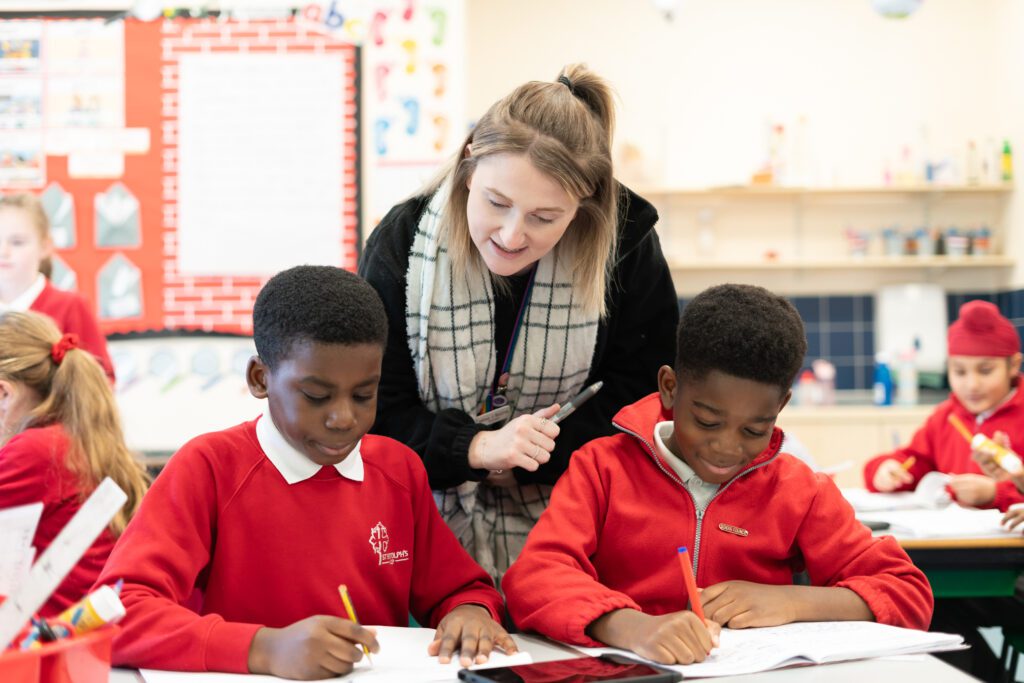English Writing Subject Leader: Mrs L Pollard
For any more information on St Botolph’s English Writing Curriculum, please contact the office.
Intent
We acknowledge the importance of English skills in enabling our pupils to access all areas of the curriculum and the wider world. Through the high-quality teaching of English, pupils are encouraged to develop spiritually, culturally, emotionally, intellectually, and socially. Our curriculum enables pupils to acquire knowledge; building on what they already know, deepening skills and understanding and fostering inquisitive analytical minds.
We intend for our children to learn through immersion in literature. Children build on their skills in reading and writing, as well as on their phonic and spelling knowledge, as they develop greater independence in writing for purpose and meaning. We aspire for our pupils to become successful and purposeful writers, confident and expressive readers and articulate orators who can inspire and empower others.


Implementation
The understanding of the power of language, in both its written and spoken form, is an integral part of our English lessons through our use of the Read into Writing programme, EdShed Spellings, Sir Linkalot and Accelerated Reader. The progression of skills for writing, reading, and speaking and listening, are developed through the year groups, with grammar, punctuation, and spelling skills of key importance within all lessons. Key texts and outcomes are chosen carefully to engage and develop critical thought, response and enjoyment. Pupils listen, read, write, speak, role-play, question, analyse, edit, and improve, to gain the essential English skills required to progress. Sequences of lessons develop and embed knowledge and skills, building on previous learning. There is also the opportunity to regularly review, evaluate and recap understanding and address misconceptions. All children have the appropriate level of support and challenge.
Teachers monitor learning and skills, identifying errors and misconceptions, exploring language, plots and characters further, and providing direct feedback. Children are taught to become free thinkers, accomplished writers and confident speakers.
Lessons are well-resourced and teachers deliver high-quality teaching and learning opportunities which are monitored closely by the leadership team.
Our curriculum lends itself to active learning; we take every opportunity to enhance learning and enjoyment in English. To support the well-structured and progressive curriculum, we constantly celebrate the diversity and power of language. Through different avenues (author visits, storytelling events, World Book Day, book fairs, shared reading activities, forest school), children explore their acquisition and understanding of language, thus developing their speaking and listening skills which are essential to becoming an accomplished reader and writer.
Impact
English at St Botolph’s is fun, engaging, and of high-quality, providing children with the foundations for communicating effectively with the world around them. By the end of the curriculum, pupils have the tools to write purposefully, spell confidently and express themselves clearly. Pupils feel confident in their reading skills; they are excited about literature, show that they are actively curious to question more and see the importance and relevance of their English skills and knowledge as they build their futures.
Progress is measured through a child’s ability to read, write, speak and spell with greater perception and accuracy, detail and purpose. The focus on vocabulary ensures all children can visualise and respond to texts with confidence. Evidence of English skills and learning are recorded in pupil’s books and moderated throughout the year. Moderation provides valuable opportunities for teachers to ensure expectations and outcomes are maintained at a consistently high level. Leaders monitor the quality and impact of the English curriculum through lesson observations, book looks and regular pupil voice to ascertain the extent to which pupils’ skills and knowledge are improving.
The impact of our English curriculum is seen across the school, as our children develop the skills to access the rest of the curriculum successfully. Further evidence of this impact can be seen when our pupils leave us equipped with the literacy skills and knowledge required for the Key Stage 3 curriculum, and for life as an adult.

English Writing in Each Stage
The children in our EYFS are taught using the Little Wandle Revised Letters and Sounds Systematic Synthetic Phonics Scheme. The children are taught phonics every day and will learn the phonemes, graphemes and all digraphs as well as the correct letter formation they need in order to begin writing beyond mark-making. Those children who reach a Good Level of Development (GLD) by the end of their first full year in school will be able to form, mostly correctly, all letters and will be writing and spelling using their phonetical knowledge. Children at GLD will also be writing simple phrases and some sentences that are phonetically plausible and can be read by others, including adults. Children are encouraged and inspired to write both in their Literacy lessons through our ‘Talk 4 Writing’ scheme where they will learn about texts including Owl Babies and The Hungary Caterpillar and also in child-initiated learning time, where they may create shopping lists in the role play area or label parts of a treasure island!
Click the link here to find out more about our Phonics curriculum
English Writing Progression
SEND Information
Interventions and support are part of our ongoing assessment of our children. All of our staff offer adaptive teaching to enable access for all, providing aids, pre-teaching and other supports and interventions as outlined in the Kent Mainstream Core Standards. Our range of targeted interventions include Busy Fingers to improve the fine motor skills of our children and Colourful Semantics that assist children in how to correctly structure a sentence are available for all those who we feel need it to help their progress in writing. Word mats, coloured overlays, the pre-teaching of vocabulary and the use of Clicker 7 or 8 software is also readily available in our classrooms to continue to support our children to achieve their full potential.

